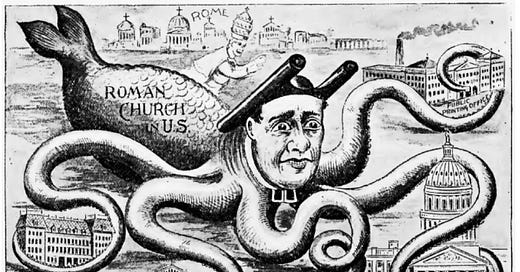When, where, how and why did the European and American administrative state(s) originate? If you have read certain judicial opinions, been to a Federalist Society talk, or even fallen so low as to read Heritage reports, you may have heard that the American administrative state originated with the sinister Woodrow Wilson and the progressives, around World War I or a little before. In fact, however, the United States had an administrative state from the beginning. Indeed the best single candidate for an original source is the even more sinister Roman Curia of the medieval era, although to be sure the papal bureaucracy continued many of the forms of the imperial bureaucracy that preceded it.
Here we offer an introductory reading list of works on the origins and development of the administrative state in the Western legal and political tradition, arranged approximately in chronological order of the historical periods they address (not by date of publication), and emphasizing the continuity between medieval origins and modern forms, and between continental and early Anglo-American versions. The even more venerable administrative state(s) of China and the Sinosphere deserve their own, separate reading list, which will follow in due course.
Andrew Lintott, Imperium Romanum: Politics and Administration. A useful account of the institutions of the Roman republican and imperial bureaucracies, and their changing forms over time.
Harold J. Berman, Law and Revolution: The Formation of the Western Legal Tradition. A classic of the sub-field, tracing many of our legal and bureaucratic institutions to papal institutions and canon law (which were themselves, of course, adaptations of imperial forms and legal principles to an important degree).
Anna Grzymala-Busse, Sacred Foundations: The Religious and Medieval Roots of the European State. A somewhat derivative but nonetheless useful updating of Berman with appropriate nuance and all the mod cons of recent scholarship.
Liber Augustalis or the Constitutions of Melfi — the law code promulgated by Frederick II Hohenstaufen for his Sicilian domains in 1231. As Ernst Kantorowicz observed in his famous biography of the great emperor, the Liber Augustalis has been called the “birth certificate of modern bureaucracy.” As Kantorowicz also observes, however, this refers to secular bureaucracy; Frederick II and his legal advisors were heavily influenced by the institutions and legal principles of the Church.
Joseph Strayer, On the Medieval Origins of the Modern State. Traces the development of the modern bureaucratic state in the key domains of justice and finance from the early 12th century through the early modern period.
Paul Craig, “English Administrative Law History: Perception and Reality,” and Paul Craig, “The Legitimacy Of U.S. Administrative Law and the Foundations of English Administrative Law: Setting The Record Straight.” These are a book chapter and a paper, rather than books, but they explain that a picture of administrative law as antithetical to the English common law and unwritten principles of English constitutionalism — a picture handed around by American scholars such as Philip Hamburger — is simply incorrect. In fact, as the first entry explains, the “foundational period of [English] administrative law … runs from the mid-sixteenth century onwards, with earlier origins.”
Jerry L. Mashaw, Creating the Administrative Constitution: The Lost One Hundred Years of American Administrative Law. This work and the next demonstrate that the American administrative state, created by broad delegations from Congress, existed right from the beginning of the founding era and indeed before, in colonial administration. The point about early delegations is taken up in an excellent paper by Julian Davis Mortenson and Nicholas Bagley, “Delegation at the Founding.”
William J. Novak, The People’s Welfare: Law and Regulation in Nineteenth-Century America. The blurb says it all: “Critics hark back to a time before the state intervened so directly in citizens' lives. In The People's Welfare, William Novak refutes this vision of a stateless past by documenting America's long history of government regulation in the areas of public safety, political economy, public property, morality, and public health. Challenging the myth of American individualism, Novak recovers a distinctive nineteenth-century commitment to shared obligations and public duties in a well-regulated society.”
Enjoy!





Thank you so much for this extraordinary reading list. Much to think about.
Surprised you did not include The Governmental Habit Redux: Economic Controls from Colonial Times to the Present by Jonathan R.T. Hughes. If you are not familiar with it, you will find it useful.